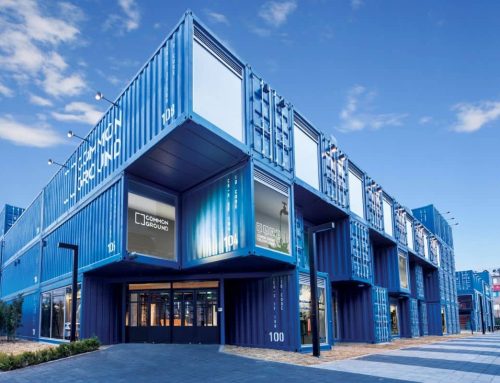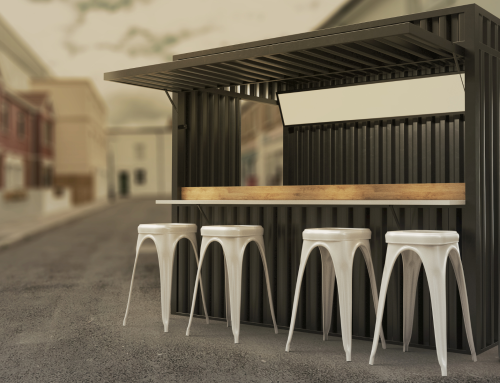The hospitality industry, a dynamic and ever-evolving sector, plays a crucial role in shaping how people experience travel, leisure, and entertainment. From luxury resorts to budget-friendly accommodations, and from fine dining restaurants to fast-casual eateries, the industry is constantly adapting to changing consumer preferences, technological advancements, and global influences.
In recent years, the hospitality industry has been witnessing a remarkable transformation thanks to an innovative and unconventional trend – the repurposing of shipping containers into unique and versatile hospitality spaces. These humble metal boxes, once reserved for the transportation of goods across oceans, have found new life as trendy restaurants, boutique hotels, cosy cafes, and even vibrant event venues. This trend not only adds a touch of creativity and sustainability to the industry but also offers practical solutions for space constraints and eco-conscious consumers.
The repurposing of shipping containers is a prime example of turning limitations into opportunities. These containers, known for their durability, portability, and stackability, are ideal for creating unconventional hospitality spaces. The hospitality industry has embraced this trend by transforming containers into functional and aesthetically pleasing establishments that captivate customers’ attention and provide unique experiences.
How the Hospitality Industry is Utilising Shipping Containers
Many in the industry are taking the customisation ability of shipping containers and becoming creative. Below are four of the most popular uses for shipping containers in the hospitality industry.
Unique Dining Experiences: From pop-up restaurants and food markets to upscale eateries, these containers offer restaurateurs the chance to create distinctive atmospheres that stand out in a competitive market. The compact size of containers encourages creative design and layout choices, making each dining establishment a one-of-a-kind experience.
Boutique Accommodations: The hospitality industry has embraced the idea of “glamping” with shipping container accommodations. These compact and well-designed spaces can be transformed into cosy and stylish boutique hotels, lodges, or even off-grid cabins. Their versatility allows for placement in scenic locations where traditional construction might be challenging.
Trendy Cafes and Bars: Shipping containers have also become a canvas for entrepreneurs looking to open trendy cafes, bars, and coffee shops. Their modular nature allows for easy expansion or relocation, catering to changing trends and customer preferences. Whether nestled in an urban setting or perched along a picturesque coastline, container-based cafes and bars provide a hip and inviting ambiance for patrons.
Event Spaces and Meeting Venues: Event planners and organisers are also capitalising on the versatility of shipping containers. These structures can be customised to serve as unique event spaces, ranging from art exhibitions and product launches to weddings and conferences. Their mobility and adaptability make them an ideal choice for hosting gatherings in various settings, indoors or outdoors.
Innovative Examples of Container-Based Hospitality Spaces
There are some great examples of container-based hospitality spaces in our communities, with some offering some very interesting styles.
Hotel WineBox (Valparaiso, Chile)
Hotel WineBox is constructed out of 25 salvaged shipping containers while repurposed furniture is also used throughout: old bathtubs and sinks were turned into lounge seating; bed frames were made from wood from wineries; and decommissioned wine barrels serve as barstools.
Quadrum Ski & Yoga Resort (Gudauri, Georgia)
The Quadrum Ski & Yoga Resort features stacked shipping containers clad in wood panelling, creating a modernist ski lodge that contrasts greatly with the Caucasus Mountains backdrop.
Devil’s Corner (Tasmania, Australia)
The cellar door for Devil’s Corner Winery was made from repurposed shipping containers. Beyond a tasting room, there’s a lookout tower where visitors can take in the surrounding scenery.
String Bean Alley, Queen Victoria Markets (Melbourne, Victoria)
As part of the Queen Victoria Market’s $250 million renewal, String Bean Alley has had a makeover; 26 independent traders have set up shop in remodelled shipping containers.
Seance, Federation Square (Melbourne, Victoria)
Back in 2017, UK theatre-makers Darkfield and their Australian counterparts Realscape Productions, brought an immersive performance to Victoria in a shipping container.
Sustainability and Environmental Benefits
At a time where sustainability is a top concern, repurposing shipping containers offers several environmental benefits. By giving these containers a second life, the hospitality industry reduces the demand for new construction materials, minimises waste, and lowers its carbon footprint. Additionally, the relatively quick conversion process results in reduced construction time, energy consumption, and disruption to the local environment.
The hospitality industry’s embrace of shipping container repurposing exemplifies the perfect blend of creativity, functionality, and sustainability. These somewhat bland metal boxes have transcended their original purpose and are now at the forefront of unique and memorable guest experiences. From vibrant cafes to cosy lodgings, these versatile structures continue to reshape the way we think about hospitality spaces.
As this trend evolves, we can expect to see even more innovative uses of shipping containers, demonstrating that a little imagination and a touch of sustainability can go a long way in revolutionising an entire industry.






